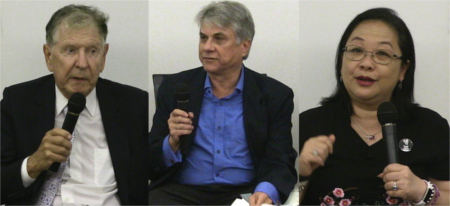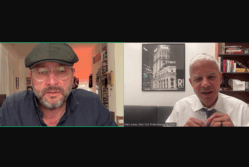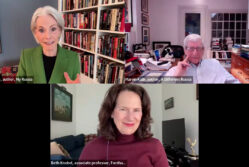Event Coverage Highlight

Panelists Call for Change as Hong Kong Protests Intensify
Scroll to the bottom or click here to see video clips from the program >>
by Emily Brown
Since the passage of Hong Kong’s controversial extradition bill in June, the country has seen massive protests against the government. The bill was withdrawn, but demonstrations aren’t stopping anytime soon, and their methods are only growing more sophisticated. On Sept. 19, author and journalist Philip Bowring joined New York-based activist Anna Yeung-Cheung to discuss the future of Hong Kong in a panel moderated by OPC governor Pete Engardio, called “Can Hong Kong Survive?”
Bowring, a British journalist based in Hong Kong since 1973, is a two-time president of the Hong Kong Foreign Correspondents Club and a former editor of the Far Eastern Economic Review. He has been a correspondent for the Financial Times and Asian Wall Street Journal and columnist for the International Herald Tribune. Yeung-Cheung, a Manhattanville College professor and Hong Kong native, is a member of Global Solidarity, a group that helps activists organize rallies, chat groups, and other events in dozens of cities in more than ten countries in support of the Hong Kong pro-democracy movement. She is the founder of NY4HK (New Yorkers for Hong Kong).
To start off, Engardio asked how much support the “pro-independence agenda” has in Hong Kong, which led to a discussion about the goals of the protests. “What we’re really talking about is just reform of the system of Hong Kong,” said Bowring. The hope is that Hong Kong is “not undermined by the one-country emphasis that has been pushed by the Carrie Lam government.” Yeung-Cheung had a similar view. “These are the things that we were promised a long time ago,” she said.
“The whole world is moving in a slightly new direction than what we have been accustomed to,” said Bowring. He briefly outlined the events leading up to the current protests, starting with the desire for increased Hong Kong autonomy by localists in the 2016 Legislative Council elections. Some young people were elected to office, but they were removed by government officials for reasons like “not taking oaths properly.” Others were accused of not being patriotic, making them not allowed to run for office at all. “Later on, they just say no, you don’t obey the Basic Law,” said Yeung-Cheung.
Engardio asked, in light of escalating violence from some protestors such as use of Molotov cocktails and occupation of an airport, if police violence is in any way justified or unprovoked. “To the best of my knowledge,” said Bowring, “not a single policeman has suffered any severe injury at all, but many protesters have been beaten or hospitalized as a result of rubber bullets and tear gas canisters.” He added that Molotov cocktails burn spectacularly but have not caused much damage. And there is no evidence they have injured police.
Yeung-Cheung also stressed that most of the violence is not being carried out by protestors, but by police. “People see a lot of violent things that look really scary,” she said, “but in reality, it’s police brutality.” She talked about the young people coordinating today’s protests, and the ways they organize on messaging apps like Telegram .
She said protesters also use a Hong Kong-based social media platform, LIHKG, to launch spontaneous protests or meetings. Like Reddit, the platform allows “upvotes” and “downvotes” for people to quickly weigh in on proposals anonymously and democratically. “This mobilization is a key point of this movement, which no one is the head of, and it is amazing.”
“How can you see a way out of the situation?” Engardio asked. Yeung-Cheung and Bowring both agreed that Carrie Lam, the chief executive of Hong Kong, has to go. “There is no leadership, there is no prospect while she is there, because she has no clue,” said Bowring. Lam resigning would force Beijing to search for other people, he explained, and make people realize that things actually can change in Hong Kong. “Carrie Lam was very arrogant in the beginning,” said Yeung-Cheung.
Ultimately, Bowring and Yeung-Cheung said they believe that the extradition bill opened a floodgate that can’t be easily stopped. “Although she said ‘let’s withdraw the bill now,’” Yeung-Cheung said, “the public is saying it’s a little too late, I want the other four demands.” Aside from withdrawing the bill, protestors are calling for Carrie Lam to step down, an inquiry into police brutality, a release of those who have been arrested, and greater democratic freedoms. “One down, four to go,” Yeung-Cheung said.




